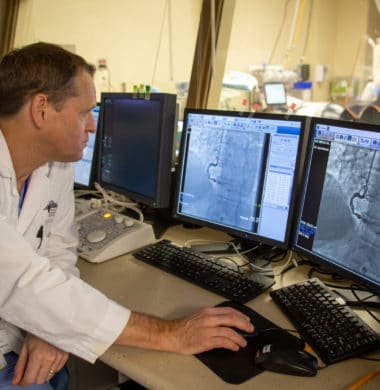What Conditions Are Treated by Interventional Cardiology?

Interventional cardiology is a field that utilizes nonsurgical, catheter-based treatments to repair narrowed arteries, damaged or weakened blood vessels, heart valve disorders, and congenital heart disease. An interventional cardiologist:
- Evaluates your medical history and performs a physical exam to assess blood pressure and vital signs, heart health, blood vessel function and lung health
- Orders and interprets imaging and lab tests
- Prescribes medications to treat heart disease and structural heart conditions
- Diagnoses and treats conditions and diseases impacting your heart and blood vessels
- Screens, monitors, and treats conditions that increase your risk of heart disease
- Works alongside your primary care doctor and other members of your medical team to ensure your cardiology treatments align with your healthcare regimen
When Should I See an Interventional Cardiologist?
General heart health issues and conditions such as high blood pressure and high cholesterol, which increase your risk for heart disease, can be managed by your primary care doctor. When a serious heart or blood vessel issue arises, you may need to consult an interventional cardiologist.
In addition, you should schedule an appointment with an interventional cardiologist if you:
- Experience changes in EKG testing that indicates a blockage to your coronary artery
- Require specialized heart treatments such as cardiac catheterization, angioplasty, or heart valve repair
- Require specialized care for a heart disease issue such as heart attack, unstable angina, or heart valve disease
Conditions Treated
Common conditions treated by interventional cardiology include:
- Angina – Chest pain that occurs when your arteries become narrowed from coronary heart disease
- Heart attack – Blood clots block the flow of oxygen-rich blood to the heart
- ST-Elevation Myocardial Infarction (STEMI) – A serious type of heart attack that occurs when one of your heart’s arteries is blocked
- Arrhythmia – An abnormal heart rhythm (your heart may beat foo slow, too fast, or irregularly)
- Heart failure – A condition that occurs when your heart isn’t strong enough to pump a sufficient supply of blood throughout your body
- Cardiomyopathy – An enlargement or weakening of your heart muscle
- Heart valve disorders – Abnormalities in the valves responsible for preventing blood from flowing in the wrong direction through your heart
- Congenital heart defects – Heart issues occurring at birth, such as patent foramen ovale or atrial septal defect
- Myocarditis – Heart inflammation
Common Treatments Performed by Our Interventional Cardiologists

Depending on your specific condition, our interventional cardiologists may recommend one of the following minimally invasive therapies:
- Transcatheter Aortic Valve Replacement (TAVR) – This procedure replaces a damaged aortic valve caused by severe aortic stenosis. During your procedure, a catheter is inserted into your groin in order to place a stent-like device across the aortic valve to widen the opening.
- MitraClip – This treatment is an excellent option for individuals suffering from moderate-to-severe mitral regurgitation, a condition where the heart valve doesn’t close properly, causing blood to flow backward into the upper chamber of the heart. During your procedure, a catheter is run from your leg to your heart in order to place the MitraClip device. This allows the mitral valve to close more fully, decreasing the backflow of blood in your heart.
- Left Atrial Appendage Occlusion – This procedure is an excellent solution for non-valvular atrial fibrillation (AFib) patients who aren’t able to tolerate long-term use of blood thinners. A permanent implant is placed to reduce the risk of stroke and bleeding associated with common blood thinners.
- Patent Foramen Ovale (PFO) Closure – This procedure closes a hole between the upper chambers of the heart in order to minimize the risk of stroke.
- WATCHMAN™ Devise Implant– Watchman is a permanent implant that offers an alternative to the lifelong use of blood thinners and may reduce the risk of stroke.
Schedule an Appointment
Please contact us today to schedule an appointment at our Structural Heart Clinic. South Denver Cardiology Associates serves patients in Denver, Littleton, and throughout the surrounding areas of Colorado.
- 9 Tips to Reduce Holiday Stress - December 11, 2025
- 6 Tips for Exercising Outdoors with a Heart Condition - May 19, 2025
- Lifestyle Changes That Can Help Manage Arrhythmia - April 30, 2025
Sign Up
As with any health concerns, your specific treatment program should be discussed thoroughly with your primary care physician as well as any specialists who may need to be consulted – like a cardiologist.
Sign Up
